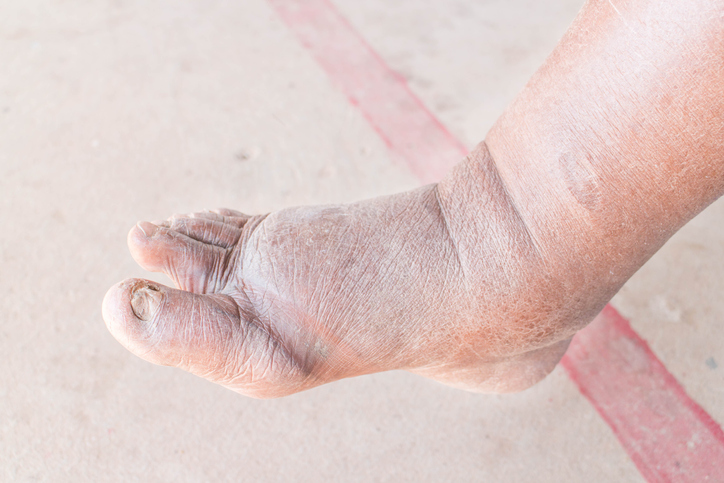Pain
At-Home Treatments for Diabetic Neuropathy

Diabetic neuropathy affects approximately 50% of individuals with diabetes. It develops from long-term elevated blood glucose levels that gradually cause nerve damage. Managing type 1 or type 2 diabetes with proper medical care, blood sugar monitoring, and a healthy lifestyle is critical in preventing or slowing the progression of diabetic neuropathy.
Although there is no known cure for diabetic neuropathy, treatment includes slowing the progression, relieving pain, managing complications, and restoring function. Keeping blood glucose levels within a healthy range is the most efficient way to slow the progression of diabetic neuropathy.
Diabetic neuropathy can have a negative impact on mood, sleep, and quality of life. In addition to conventional medical treatments for diabetic neuropathy, certain at-home treatments may provide pain relief and improve quality of life. At-home treatments for diabetic neuropathy include the following:
Maintenance of blood sugar levels
Keeping blood sugar levels within a healthy range can slow the progression and ease the pain of diabetic neuropathy. A physician should be consulted to ensure a rapid drop in blood sugar levels does not occur, as this can increase pain levels. Lifestyle factors that help maintain healthy blood sugar levels include, but are not limited to, the following:
- Maintaining a healthy body weight
- Managing stress levels
- Exercising 30 minutes per day, 5 days per week
- Eating more fruits, vegetables, low-fat dairy, and whole grains
- Eating moderate amounts of fish, poultry, nuts and beans
- Limiting red meat
- Taking prescribed medications as recommended by a health care provider
Medications
- Over-the-counter pain relievers can ease pain caused by diabetic neuropathy. Examples include acetaminophen, aspirin, ibuprofen or naproxen. A physician should be consulted if any of these medications are taken on a regular basis, as prolonged use can cause serious health issues.
- Capsaicin cream can provide relief from the burning pain associated with diabetic neuropathy. Low doses of capsaicin cream can be purchased over-the-counter; however, if a higher dosage is needed, it must be prescribed by a physician.
Supplements
- Vitamin D can help protect against nerve pain. The skin produces this essential nutrient when exposed to sunlight. Low levels of vitamin D are associated with increased pain levels. Taking a vitamin D supplement once per week may reduce pain levels.
- Vitamin B complex may help reduce pain associated with diabetic neuropathy. Low levels of vitamin B12 increase the risk of nerve damage. Vitamin B6 helps the brain produce certain chemicals; low levels of these chemicals may increase pain levels.
Most people get enough B vitamins via the foods they eat. A physician should be consulted prior to taking a vitamin B complex supplement to ensure it is recommended. - Alpha-lipoic acid is a powerful antioxidant. It is naturally produced by the body in small amounts; however, supplementing the diet with alpha-lipoic acid can help regulate blood sugar levels, ease nerve pain, and prevent further nerve damage.
Warm baths
Warm baths help boost circulation and promote relaxation. A warm bath can provide instant pain relief. However, because diabetic neuropathy can lead to loss of sensation, so careful monitoring of the water temperature in the bath is advised. A warm foot bath with chamomile or nettle leaves can also ease pain.
Foot care
Proper foot care is extremely important when dealing with diabetic neuropathy. Nerve damage can cause loss of sensation in the feet. A simple scratch may not be noticed and can lead to a foot ulcer or infection, so the feet should be cleaned and examined daily. Shoes should be comfortable and well-fitting.
Additional tips
- Scissors, knives and other sharp tools in the home should have safety guards to prevent injury.
- The temperature of bath and sink water should be checked with a thermometer to ensure it is not too hot.
- Potholders and gloves should be used when handling hot items, especially when removing something from the oven.
- A cane or walker can help provide stability to reduce the risk of falling.
- Nightlights can help prevent trips and falls due to lack of proper lighting.
- Hands and feet should be properly covered when going outside in cold weather.
- Alcohol and smoking should be avoided. Tobacco decreases circulation in the feet, and alcohol increases nerve pain. Prolonged use of alcohol and tobacco can cause nerve damage.
- Added pressure on an area affected by diabetic neuropathy should be avoided (e.g., leaning on elbows, crossing the legs, etc.)
- Caffeine should be limited or avoided because it can interrupt proper sleep hygiene. Sleep plays an essential role in pain management.


















